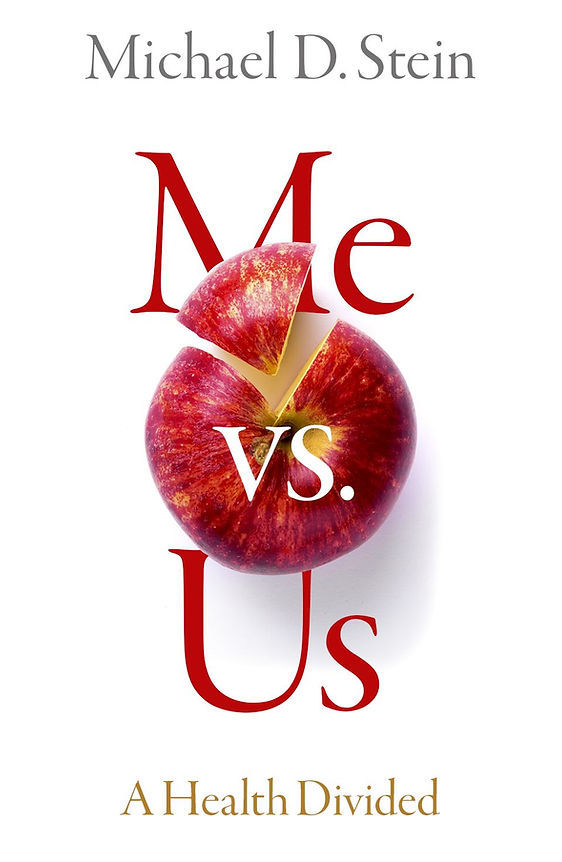Professor’s New Book Examines Divide Between Public Health and Medicine.
Professor’s New Book Examines Divide Between Public Health and Medicine
In Me vs. Us: A Health Divided, Michael Stein, professor and chair of health law, policy & management, outlines how the country’s focus on individual medicine endangers the public’s health.
In the United States, we spend more on health care per year than any other high-income country in the world, with an average of nearly $12,000 per person. At the same time, we spend less than $300 per person per year on public health.

In his new book, Me vs. Us: A Health Divided, Michael Stein, professor and chair of health law, policy & management at the School of Public Health and a primary care physician, aims to answer why this has occurred. He examines how public health has repeatedly been overshadowed by individual medicine and offers eight reasons as to why America’s interest in the delivery of health care has long superseded our interest in public health and its focus on the core social, economic, and environmental forces that shape health.
“Public health has continually ‘lost’ the perspectival conflict to health care. It has lost in our funding priorities and, before the COVID-19 pandemic, in our daily conversations,” says Stein. “The restoration of the proper status of public health depends on our collective understanding of why we have underestimated its value in the first place.”

As a thought leader in the field, Stein has been writing about medicine and public health for decades. He has published over 400 scientific journal articles, spanning the topics of sleep, pain, addiction, HIV/AIDS, risk-taking, and mental health. He is also the award-winning author of six novels and five books of non-fiction, and his writings have been published widely in the press, including in The Washington Post, The Boston Globe, and The New York Times. Stein is also the executive editor of Public Health Post at SPH, an online magazine that informs the broader conversation on health and social justice.
Stein sat down to share more about his new book, its key takeaways, and how public health may hold the solutions to our most concerning health crises.
Q&A
with Michael Stein
The title of the book is quite thought-provoking. Can you talk more about it?
The ethos of self-help is ubiquitous in the United States; it dictates everyone’s view of health. It is based on powerful ideas about individualism. Americans mostly think of life as an individual journey, as the story of Me. I make my own career success or failure. I am, by nature, self-absorbed in the pursuit of happiness. I can optimize my own health. All of this leads to the dominance of the medical perspective, the triumph of the therapeutic and the care of the individual.
Public health has a different ethos: Us-oriented. To think of ourselves as part of a group is what a public health perspective asks of us. The divide of these two perspectives, Me vs. Us, is playing out in many societal arenas at the moment, but none more so than in health.
What are the main takeaways of the book?
I would say first, that public health solutions, in the end, are policy solutions, and good policy solutions arise only when society is paying attention to who is making decisions. That said, we need to elect public officials who have an interest in health, and think of the intended and unintended health effects in every piece of legislation they vote for. Second, we should keep in mind the fundamental concept of needing to change societal incentives from sickness cure to keeping and protecting health. And third, as long as the medical care system is dominant, it needs to embed public health thinking and practice.
What needs to be done to change the American mindset around placing higher value on individual medicine over the work of public health? Is this possible?
It would take a deep cultural change. The medical perspective asks, “What can I do to make myself healthy?” The public health perspective asks, “In addition to helping myself, what can we do to improve the health of others?” The work of public health, beyond the moments of infectious disease outbreaks, which have their own momentum, is mule work—slow, difficult, painstaking. We have to decide if we have the patience and attention to do it.
Who is this book for?
It’s for anyone interested in asking the question of why people living in the richest counties in the US live twenty years longer, on average, than people living in the poorest counties, and who believes the health care system doesn’t and will never have an answer. Or anyone interested in how to reverse the past fifty years of worsening weight gain among Americans. Public health has some remedies that begin with a different way of thinking about health and what contributes to life expectancy.
What else do you have coming out?
In about a month I have another book out called Accidental Kindness: A Doctor’s Notes on Empathy. It consists of a series of essays about doctors and patients interacting, and I try to unlock the mystery of how kindness, or unkindness, happens during the intimate dance between these two partners, during illness.
I’m a primary care doctor, and this is a Me book, but dyadic too in that I include stories of patients I’ve cared for and stories of when I have been a patient. I interrupt in places to take the reader on digressions about the neuroscience of empathy, how we make medical decisions, and studies that have evaluated whether kindness actually matters in terms of medical outcomes.